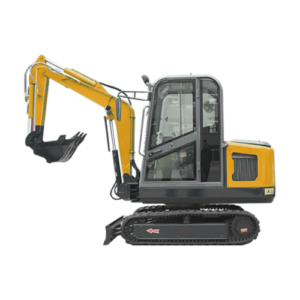Introduction
In an era marked by heightened environmental consciousness, the construction industry is making significant strides towards sustainability. Excavators, the workhorses of construction sites, are not exempt from this green revolution. The best excavator brands are increasingly embracing eco-friendly technologies to minimize their carbon footprint while maximizing operational efficiency. This comprehensive exploration delves into the realm of eco-friendly excavators, uncovering the innovative solutions, benefits, and considerations that define these green giants in the construction landscape.
Table of Contents
- Green Construction: The Urgency for Eco-Friendly Excavators
- Eco-Friendly Innovations: Pioneering Technologies in Excavator Design
- Hybrid Excavators: Merging Power and Efficiency for Reduced Emissions
- Electric Excavators: Harnessing Clean Energy for Sustainable Performance
- Biodiesel and Biofuel Adoption: Reducing Carbon Footprint Through Fuels
- Regenerative Braking Systems: Channeling Energy Back into Operations
- Eco-Mode and Auto-Idle: Intelligent Energy Management in Excavators
- Reducing Noise Pollution: Quieter Operations for Urban Environments
- Lifecycle Analysis: Evaluating the Comprehensive Environmental Impact
- Carbon Offsetting Initiatives: Balancing Emissions and Sustainability
- Operator Training for Eco-Friendly Practices: Maximizing Efficiency
- Comparative Analysis: Assessing Eco-Friendly Features Across Brands
- ROI Calculation for Eco-Friendly Options: Savings Beyond the Surface
- Future Trends: The Evolution of Eco-Friendly Excavators
- FAQ
1. Green Construction: The Urgency for Eco-Friendly Excavators
The construction industry’s impact on the environment is being scrutinized like never before. Eco-friendly excavators are crucial to achieving sustainable construction practices and reducing carbon emissions.
2. Eco-Friendly Innovations: Pioneering Technologies in Excavator Design
Eco-friendly excavators integrate advanced technologies such as hybrid systems, electric powertrains, regenerative braking, and intelligent energy management to optimize efficiency and minimize environmental impact.
3. Hybrid Excavators: Merging Power and Efficiency for Reduced Emissions
Hybrid excavators combine internal combustion engines with electric power to enhance fuel efficiency and reduce emissions. These machines offer a compelling balance between power and eco-consciousness.
4. Electric Excavators: Harnessing Clean Energy for Sustainable Performance
Electric excavators rely solely on electricity to power their operations. By eliminating emissions at the source, these machines contribute to cleaner air and reduced noise pollution.
5. Biodiesel and Biofuel Adoption: Reducing Carbon Footprint Through Fuels
Eco-friendly excavators can run on biodiesel or biofuels, reducing carbon emissions compared to traditional fossil fuels. These renewable alternatives lessen the environmental impact of construction activities.
6. Regenerative Braking Systems: Channeling Energy Back into Operations
Regenerative braking systems capture and store energy during deceleration, which can then be used to power the excavator’s operations. This innovative technology reduces energy wastage and boosts efficiency.
7. Eco-Mode and Auto-Idle: Intelligent Energy Management in Excavators
Eco-mode and auto-idle features optimize fuel consumption by adjusting engine speed based on workload demands. Auto-idle reduces fuel consumption during periods of inactivity.
8. Reducing Noise Pollution: Quieter Operations for Urban Environments
Eco-friendly excavators often operate more quietly than their conventional counterparts. This reduced noise pollution is advantageous for construction projects in urban areas, contributing to community well-being.
9. Lifecycle Analysis: Evaluating the Comprehensive Environmental Impact
Evaluating the environmental impact of eco-friendly excavators involves considering factors beyond fuel consumption, including manufacturing, maintenance, end-of-life disposal, and overall sustainability.
10. Carbon Offsetting Initiatives: Balancing Emissions and Sustainability
Some excavator brands participate in carbon offsetting initiatives, where they invest in projects that mitigate carbon emissions, effectively balancing out the environmental impact of their operations.
11. Operator Training for Eco-Friendly Practices: Maximizing Efficiency
Training operators in eco-friendly practices, such as efficient equipment operation and maintenance, plays a significant role in optimizing fuel consumption and reducing emissions.
12. Comparative Analysis: Assessing Eco-Friendly Features Across Brands
Comparing eco-friendly features across excavator brands involves analyzing their technological offerings, emissions reduction strategies, fuel efficiency, and overall commitment to sustainability.
13. ROI Calculation for Eco-Friendly Options: Savings Beyond the Surface
Calculating return on investment for eco-friendly excavators involves considering not only initial costs but also long-term savings from reduced fuel consumption, lower maintenance, and potential incentives.
14. Future Trends: The Evolution of Eco-Friendly Excavators
The future of eco-friendly excavators holds promise for even more advanced technologies, increased adoption of electric power, enhanced energy storage solutions, and further reductions in emissions.
15. FAQ
Q1: Are eco-friendly excavators more expensive than traditional models?
Eco-friendly excavators may have a slightly higher initial cost due to advanced technologies, but the long-term savings in fuel and maintenance costs often offset the initial investment.
Q2: Can eco-friendly excavators handle heavy-duty tasks effectively?
Yes, eco-friendly excavators are designed to handle a wide range of tasks, including heavy-duty operations. Manufacturers engineer these machines to balance efficiency and performance.
Q3: Do eco-friendly excavators compromise on power and capabilities?
Eco-friendly excavators prioritize efficiency and emissions reduction, but advancements in technology allow them to deliver impressive power and capabilities comparable to traditional models.
Q4: Are there government incentives for using eco-friendly excavators?
Yes, in many regions, government incentives, tax breaks, and subsidies are offered to companies that invest in eco-friendly equipment as part of environmental initiatives.
Q5: How do eco-friendly excavators contribute to LEED and green building certifications?
Eco-friendly excavators contribute to Leadership in Energy and Environmental Design (LEED) and green building certifications by reducing emissions, conserving resources, and aligning with sustainable practices.
Q6: Can eco-friendly excavators be used in remote or off-grid areas?
Yes, some eco-friendly excavators with electric power options are suitable for remote or off-grid areas where access to traditional fuel sources may be limited.
Conclusion
Eco-friendly excavators exemplify the construction industry’s commitment to sustainability and responsible resource management. As technology advances and environmental consciousness deepens, the adoption of these machines becomes more than a choice—it’s a responsibility. By exploring the innovative technologies, benefits, and considerations that define eco-friendly excavators, construction professionals can embark on a path that not only maximizes efficiency and performance but also contributes to a greener and more sustainable future for all.



